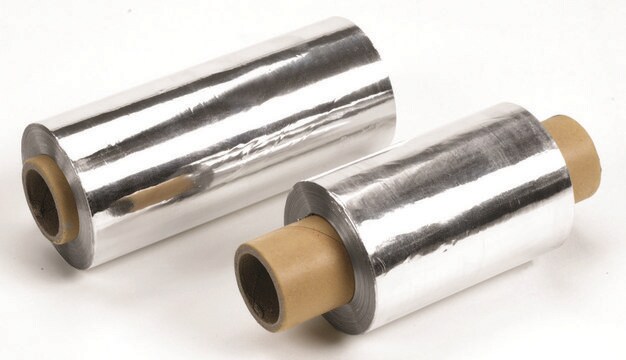Key Documents
326860
Aluminum
foil, thickness 0.13 mm, ≥99.99% trace metals basis
About This Item
Polecane produkty
Próba
≥99.99% trace metals basis
Postać
foil
temp. samozapłonu
1400 °F
rezystywność
2.6548 μΩ-cm
grubość
0.13 mm
tw
2460 °C (lit.)
mp
660.37 °C (lit.)
gęstość
2.7 g/mL at 25 °C (lit.)
Zastosowanie
battery manufacturing
ciąg SMILES
[Al]
InChI
1S/Al
Klucz InChI
XAGFODPZIPBFFR-UHFFFAOYSA-N
Ilość
Kod klasy składowania
11 - Combustible Solids
Klasa zagrożenia wodnego (WGK)
WGK 3
Temperatura zapłonu (°F)
Not applicable
Temperatura zapłonu (°C)
Not applicable
Środki ochrony indywidualnej
Eyeshields, Gloves, type N95 (US)
Wybierz jedną z najnowszych wersji:
Masz już ten produkt?
Dokumenty związane z niedawno zakupionymi produktami zostały zamieszczone w Bibliotece dokumentów.
Klienci oglądali również te produkty
Produkty
In many technologies, performance requirements drive device dimensions below the scale of electron mean free paths (λe). This trend has increased scientific interest and technological importance of electrical resistivities at the nanoscale.
Biomedical implants are essentially foreign substances within the human body that must survive many years’ exposure to demanding mechanical and physiological conditions. Despite these challenges, metal implants have been widely used to substitute for or rebuild hard tissues such as bones and teeth.
The unique properties of the rare-earth elements and their alloys have brought them from relative obscurity to high profile use in common hightech applications.
Nasz zespół naukowców ma doświadczenie we wszystkich obszarach badań, w tym w naukach przyrodniczych, materiałoznawstwie, syntezie chemicznej, chromatografii, analityce i wielu innych dziedzinach.
Skontaktuj się z zespołem ds. pomocy technicznej


